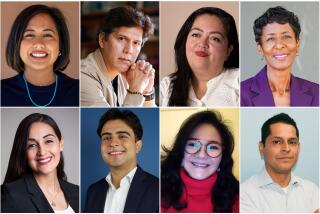With More Money and Media, I Coulda Been a Contender
- Share via
With no money, resume or skills to speak of, in 1993 I decided to run for mayor of L.A. hoping to sneak some relatively radical ideas into public discussion.
I was 22 and had passed on college in favor of traveling and writing and publishing my own zine, while working various dead-end, minimum-wage jobs. I felt qualified to run for mayor because I had been spending much of my time wandering around L.A. documenting the city for my zine, following local politics and being overly opinionated. Though I was iffy about soliciting donations, I figured running for mayor would help get my message out.
After collecting more than 1,000 signatures (no easy task, even with the help of my parents and about eight friends), my name was officially placed on the ballot along with 23 others. With that, it seemed there was the tiniest chance that I could actually be elected. “People might poke the wrong hole,” I thought.
I was invited to speak and debate the other candidates at black churches, Jewish temples, high schools, housing projects and community colleges, where the discussions and arguments were often inspired, confrontational and substantive.
Public office shouldn’t be limited to career politicians, millionaires and the occasional professional wrestler. The mayor’s race, especially in elections when there’s no incumbent, tends to attract a motley assortment of candidates who are a true reflection of the city--definitely the case in 1993. Of course, there were the usual suits running: then-Councilman Mike Woo, Councilman Joel Wachs (who’s running again this year), Councilman Nate Holden and the millionaire Richard Riordan, who claimed to be “tough enough to turn L.A. around.” Watching them pander to various audiences was difficult to stomach sometimes.
But there was also Ted Hayes Jr., the eloquent homeless advocate who ended up with 2,966 votes; Leonard Shapiro, the then-73-year-old, extremely informed governmental gadfly (who’s also running again this year); Kim Allen, the Socialist Workers Party candidate who added a class-conscious, Marxist perspective to the debates, and “Melrose” Larry Green, the Howard Stern fanatic who interjected chaos and absurdity into the mayor’s race whenever it was most needed. Together, we debated at public forums from Tujunga to San Pedro, before audiences of anywhere from 15 to 400 people.
But more often, only the media’s chosen candidates (with either money or a career in politics) were invited to debate, and the rest of us would have to cause a ruckus to get a chance to speak. This was often frustrating and sometimes exhausting, but there were moments of triumph--on a few occasions, we stormed the stage and got our five minutes to rant.
I was often amazed at the various means political organizations all over town would use to silence those who they did not deem worthy of mayorship. There was one forum where one of the candidates, John Borunda, a friendly ex-cop who was also relegated to underdog status despite having a campaign staff and knowing everyone, had to fight his way onto the stage along with the rest of us and was threatened with arrest by Rep. Maxine Waters (D-Los Angeles). One time, Hayes commented to Wachs that it would be great to have a debate with the 13 lesser-known would-be mayors against the 11 media-appointed ones. “It would be great,” replied Wachs candidly, “except none of us would come.”
Still, I’d often get a decent amount of time to present my case at these debates, and average-sized sound bites on TV and radio. Near the end of the campaign, I pulled a little stunt where a friend and I sold lemonade in front of City Hall for 25 cents a cup to show that you don’t have to be a millionaire or take money from developers and lobbyists to run for public office.
KABC-TV turned it into a neat, short piece on the local news with a shot of Riordan’s expensive commercials, Woo acting phony, Holden picking up an endorsement and me and my box of quarters. I even got a juicy sound bite in there where I said elections shouldn’t be about money and power. Immediately after the press left, some cops showed up and kicked us out. One cop said he could have cited us for several infractions, including selling lemonade without a permit.
My platform, which I felt was difficult for some audiences to comprehend, was a somewhat complicated, anarchistic-themed vision of a freer city, where the mayor’s main task was to encourage residents and communities to become self-sufficient.
I proposed legalized squatting and vending, community barter markets, neighborhood policing by trained residents, a dramatically restructured transportation system and a city government that supported street performing and free public art.
In 1993, however, voters were worried about crime, and Riordan was elected, promising 1,000 more cops. I received 643 votes, which had to include a lot of people I had never met. I had spent $70 on my campaign and had one benefit at my house where Kill Whitey and Beck performed and a few folks threw some dollars in a jar.
I recommend running for mayor. I saw up close how the filthy mechanisms of electoral politics work. I met conservative homeowners, oppressed 16-year-olds, irate grandmas, gang members, rabbis and inane TV anchormen. More than any other experience I can think of, running for mayor made me appreciate Los Angeles as the unique, sprawling mess I may never escape.
*
Adam Bregman, a native of Los Angeles, is a freelance journalist.
More to Read
Sign up for Essential California
The most important California stories and recommendations in your inbox every morning.
You may occasionally receive promotional content from the Los Angeles Times.













